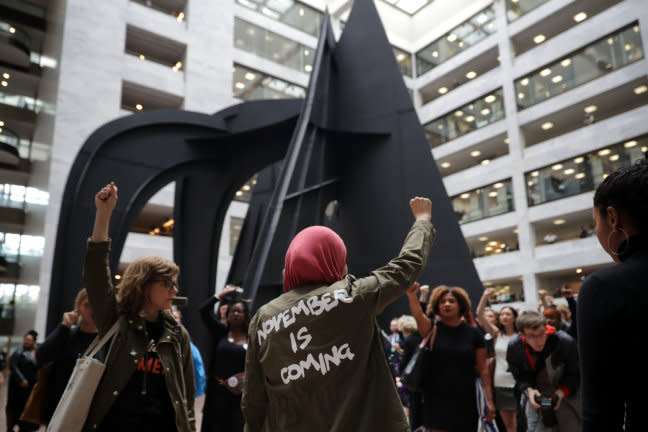Turn Anger Into Action: What You Can Do to Fight for Women
It's been a tough day. Hell it's been a tough week, month, year for women as we continue every day to fight for our rights and our stories to be heard.
As the drama unfolds around the testimony of Dr. Christine Blasey Ford, we want to shed a spotlight on how you can channel all your feelings (rage, sadness, anxiety, hope, frustration, all of them) into ways that can help create change for women that's bigger than one person or one moment in time.
We're upset. We're exhausted. But we're not backing down. Here's how we keep up the fight and push for progress:
Support Survivors
It can be as simple as calling on a loved one to check in. The fact that 1 in every 3 people is affected by violence, we're all but almost certain to know someone impacted by this issue.
If you're looking to take a bigger step of action, you can donate, volunteer, or help amplify organizations across the country that are doing the gritty, day-to-day work to support survivors.
Here are a few fighting the good fight you can support:
The NWLC provides legal support to men and women affected by abuse. Through the NWLC, you can support the Time's Up Legal Defense Fund, which is raising funds to foot the legal cost of survivors who are taking their claims to court, three-fourths of which are low-income men and women. As of this week, the fund has raised more than $21 million dollars and received more than 3,500 requests for help.
Founded by MAKER Amanda Nguyen, Rise is working to empower survivors of assault and pushing for legislation to be signed on local, state, and global levels that would protect the rights of survivors. Through the work of Rise, Nguyen helped pass the first ever set of federal protections for victims, called the Sexual Assault Survivors' Bill of Rights. Find out how you can get involved in your community here.
Register to Vote
When it comes to the Supreme Court, for now we can raise our voices and press our Senators to do what we think is right.
However, in case you haven't heard, there's an election coming up this November. Every two years, we have the opportunity to go out and make decisions on who represents us in Congress. In the case of Kavanaugh, these Senators are determining the future of the Supreme Court. In the case of our future, let's make sure our Senators—and all politicians—actually speak up for women and women's rights.
Up and down the ballot, in cities, states, and even in D.C., change is happening. More women and people of color are running for office than ever before. But none of this change is possible if we all don't vote and make our voices heard.
To find out more about how you can register to vote and the issues at stake in your own community, check out When We All Vote, an initiative spearheaded by former First Lady Michelle Obama.
Support Diverse Candidates Running for Office

The Senate Judiciary Committee, which leads the evaluation on Supreme Court Justices, has never had a Republican woman in a seat. And this is the first year the committee even has any people of color join their ranks ever—Senators Kamala Harris, Cory Booker, Mazie Hirono. We already know that women make up more than half of the population, yet only 20% of Congress.
Here are some impactful organizations recruiting women and minorities to run for office and giving them the resources to do it:
Founded by Ellen Malcolm in 1985 as a resource to help Democratic women get fundraising to run for office, Emily's List has grown into one of the largest organizations equipping women to run for office in 2018. Since the 2016 election more than 30,000 women have expressed interest in running for office through Emily's List.
She Should Run, which supports women on both sides of the aisle, is aiming to recruit 250,000 women by 2030 across every level of government, starting with city council and running all the way to the top. With a donation of $25 you can support a woman in their "Ask a Woman to Run" program. With a donation of $50, you can inspire a girl to lead through their online course "for parents who want their girls to grow up to be tomorrow's leaders."